Results for: Jennifer Kuzma

Cultural Beliefs and Stakeholder Affiliation Influence Attitudes Towards Responsible Research and Innovation | Frontiers in Political Science
Jennifer Kuzma, June 24, 2021 | Biotech developers are concerned about the future of gene editing having experienced the contentious history of first-generation GM foods. They have also expressed desires to do better with public engagement in gene-editing innovation. The framework of Responsible Research and Innovation (RRI) may provide a way forward to act on their desires for greater public legitimacy.

Science in the Cabinet: Implications for the Future of Biotech Research and Innovation | GES Colloquium (Zoom)
Hear a panel discussion from 3 experts on the future of biotechnology policy under the Biden administration. Panelists: Jennifer Kuzma, Robert Cook-Deegan, and Dan Levitan.
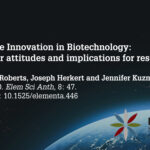
Responsible Innovation in Biotechnology: Stakeholder attitudes and implications for research policy | Elementa
Jennifer Kuzma, September 1, 2020 | This article explores attitudes of stakeholders involved in biotechnology towards the Responsible Innovation (RI) framework.
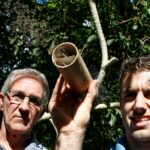
Genetically modified mosquitoes could be released in Florida and Texas beginning this summer – silver bullet or jumping the gun?
Jennifer Kuzma, June 3, 2020 | Release of GM mosquitoes in Florida is imminent. But a multidisciplinary team of scientists believe that more studies are needed first. They encourage a publicly accessible registry for GM organisms.

GES Center awarded half-million dollar grant to study responsible innovation of food nanotechnology
July 25, 2019 | Khara Grieger and Jennifer Kuzma will lead a two-year, USDA-funded study of responsible innovation of food nanotechnology.
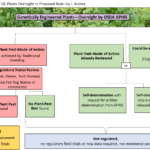
Biotechnology Oversight Gets an Early Make-Over by Trump’s White House and USDA: Part 2 – The USDA-APHIS Rule
Jennifer Kuzma, July 2, 2019 | USDA-APHIS has proposed an oversight process for GE crops that appears to be a significant departure from the current one. This article discusses the features of the proposed new rule, along with its strengths and weaknesses and my recommendations for how it should be amended.

Biotechnology Oversight Gets an Early Make-Over by Trump’s White House and USDA: Part 1—The Executive Order
Jennifer Kuzma, June 18, 2019 | Last week, the Trump administration set the tone for its oversight of agricultural biotechnology (ag biotech) through two major actions: 1) Signing the Modernizing the Regulatory Framework for Agricultural Biotechnology Products Executive Order; and 2) Proposing a draft rule on the Movement of Certain Genetically Engineered Organisms (GEOs), changing how USDA reviews GE plants.

Procedurally Robust Risk Assessment Framework for Novel Genetically Engineered Organisms and Gene Drives
Jennifer Kuzma, March 8, 2019 | This article reviews the current state of gene-editing regulation for crops, illuminating the ways in which technology developers are repeating practices that may lead to the public and ethical failures of the first generation genetically engineered crops, and argues that the contentious socio-political history of genetic engineering will repeat itself for gene editing if these continue.
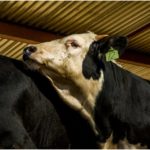
WP: Gene-edited farm animals are coming. Will we eat them?
“We’re at this inflection point in society, where gene editing is really taking off, and now is the time we could have a more sustained public conversation about how we want it used in our world and how we don’t want it to be used,” said Jennifer Kuzma, co-director of the Genetic Engineering and Society Center at North Carolina State University. “All the polls indicate that people are less comfortable with animal biotechnology than plant biotechnology… A regulatory system cannot be based 100 percent on science or scientific risk, and values come into play when setting the standards.”
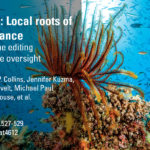
Editing nature: Local roots of global governance
Dr. Jennifer Kuzma, Goodnight-NC GSK Foundation Distinguished Professor and Co-director of the Genetic Engineering and Society Center, was one of the lead authors on an interdisciplinary team calling for global oversight of environmental gene editing in this Science Policy Forum, Editing Nature: Local roots of global governance.

Science: Trump’s agriculture department reverses course on biotech rules
It’s a predictable move by President Donald Trump’s White House to take another look at the policies of the previous administration, says Jennifer Kuzma, a social scientist who co-directs the Genetic Engineering and Society Center at North Carolina State University in Raleigh. “I expected them to eventually catch wind that this was something that USDA was doing, and reverse it.”
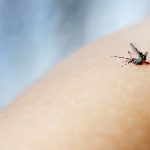
Mosquitoes, Zika and Biotech Regulation
Biotech policy expert Jennifer Kuzma argues that authorities are missing an opportunity to revise outdated rules related to modern innovations in biotechnology.

NC State Named a Fulbright Top Producing Institution
NC State has been recognized as one of the universities with the highest number of students, faculty and administrators selected for both the U.S. Fulbright Student and Scholar Programs, including three GES faculty members and an AgBioFEWS Fellow in 2023–24.

Amanda Pierce—Exploring Policy and Regulation of Emerging Biotechnologies For Use In Controlling Pest Populations | GES Colloquium
IN PERSON. Discussion of EPA’s role in the regulation of biotechnology and the development of policies and regulations for emerging technologies.

Future of Food: Near-Future Genetically Engineered Foods: Prospects and Controversies
REGISTRATION REQUIRED. Come try a selection of GE foods, such as the Pinkglow pineapple, and join us for a panel discussion on what stuff you should know about the next generation of genetically engineered foods.